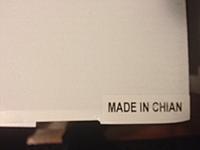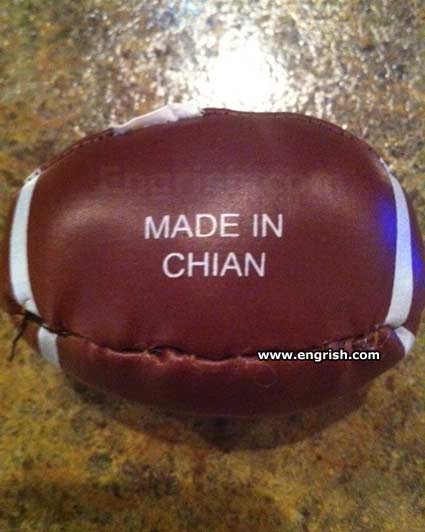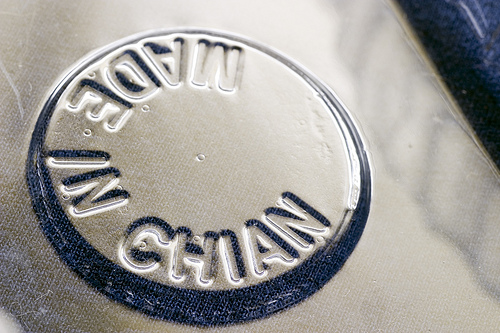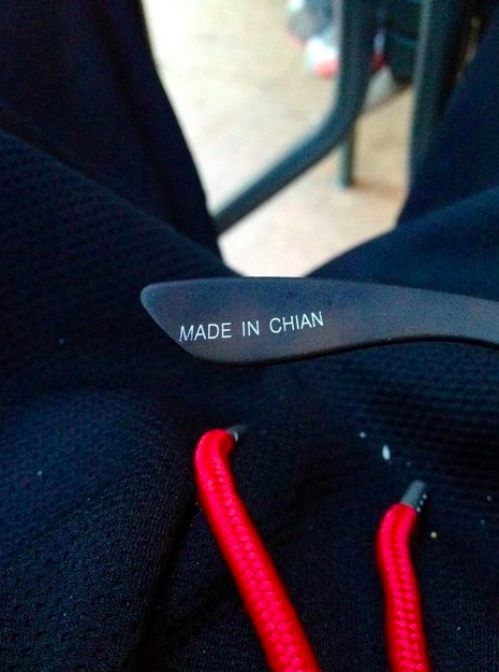Made in Chian
« previous post | next post »
From theChive:
At first I thought that might have been a unique slip-up, but it turns out that "Made in Chian" is common. There has been at least one essay on the subject, and images documenting this spelling are legion. Here are just a few.
From RCGroups:

From TranslatorsCafé:

The plastic liner of a gift flower basket:

Among the things from various companies I've seen that are labeled as "Made in Chian" are cell phones, computers, furniture, filters, rubber washers, birthday candles, foodstuffs, sports equipment, clothing — just about anything you'd expect to be made in China. "Chian" was not one of the spellings that I covered in my post "The transcription of the name 'China' in Chinese characters", 6/17/2012.
Wondering what might have triggered this misspelling over and over again, I'm guessing that it may have something to do with the fact that "Chian" has the appearance of a common Chinese syllable: Pinyin "qian", Wade-Giles "ch'ien", Yale "chyan". That's just a guess, but there must some reason why this same spelling mistake is made over and over again.

Avinor said,
March 27, 2013 @ 4:42 am
Are you sure there's no town of, say, 赤安 or 池安 hidden away somewhere in the People's Republic? :)
David Morris said,
March 27, 2013 @ 6:48 am
According to a quick search online, there is an island in Greece called Chios, which produces Chian wine: http://en.wikipedia.org/wiki/Chian_wine
There is also a city in Japan called Usa I remember a high school teacher telling me about it. Wikipedia says "There have been claims that products made in this town and exported to the US in the 1960s carried the label "MADE IN USA", for it to appear as if the product was made in the United States. It is, however, a myth that Japan renamed the town "Usa" following World War II for this purpose." http://en.wikipedia.org/wiki/Usa,_%C5%8Cita
djbcjk said,
March 27, 2013 @ 6:53 am
Urban myth of the 1950s when so much tatty stuff was MADE IN JAPAN: the cunning Japanese had a small town called Usa, so they could mark their goods MADE IN USA.
Joseph F Foster said,
March 27, 2013 @ 7:20 am
And here I thought it might have been made in the capital city of that North American colony of the Middle Kingdom known as Wai-Yo Ming.
MattF said,
March 27, 2013 @ 7:25 am
Shows some weakness in proofreading, to say the least. Are there any statistics regarding two-letter transposition errors in Chinese-English translation?
pneu said,
March 27, 2013 @ 8:49 am
Sometimes I think the Chinese are just messing with us. :)
Brian T said,
March 27, 2013 @ 9:03 am
I would like to see some examples of "Made in USA" as rendered in Chinese and stamped on products (if there even are any products that we make and export to China). I bet somebody has managed to fumble that task on a scale proportionate to "Chian."
Gianni said,
March 27, 2013 @ 9:25 am
@Brian
As far as I know, New Balance shoes are branded as Made in U.S.A. in China, but only on the boxes it is stated in Mandarin 美国制造 (Made in USA), not on shoes themselves.
bks said,
March 27, 2013 @ 9:57 am
Is "Made In China" the most frequently printed sentence in the English language? It used to be
"Close cover before striking" but that was before Bic lighters.
–bks
Jongseong Park said,
March 27, 2013 @ 10:14 am
Are you sure there's no town of, say, 赤安 or 池安 hidden away somewhere in the People's Republic? :)
There are a couple of cities named Ji'an, or Chian in Wade-Giles: 集安 and 吉安. The former is somewhat familiar to Koreans as it was once the capital of one of the ancient Korean kingdoms.
julie lee said,
March 27, 2013 @ 10:35 am
I burst out laughing when I saw "Made in Chian" in the LL post above. I'd like to see "Made in China" printed more on products in stores here in America especially on packaged foods and things in the drugstore such as medicines and vitamins–aspirin for instance. Instead one frequently finds only the words "Distributed by (name of some American company". I suspect that means it's made in China for the American company, otherwise why not print "Made in USA"? I tried to find Vitamin C with "Made in the USA" but could only find various brands with the words "Distributed by…". My baby-aspirin is "Distributed by…".
Mr Fnortner said,
March 27, 2013 @ 10:36 am
Perhaps this is a result of simple confusion among Latin letters by those to whom the letters are unfamiliar. Children who speak English confuse and reverse their letters quite frequently, and they are immersed in the letters. The Chinese may not be. It seems to me that A and N could be confused for each other easily and not caught by a proofreader. Google searches for "made in chian/cihna/chnia/chani" yielded 24K, 16K, 81K, and 66 hits respectively, so it appears that transposition is fairly common. I'm really curious about "chnia". "Made in chain" produced so many hits that were otherwise sound English phrases that I didn't consider the count valid.
Pinton said,
March 27, 2013 @ 12:33 pm
That reminds me of a Chinese bootleg DVD of the anime AKIRA I bought years ago before it was available in the US. The disc volume name was "AIRKA".
Maybe if you're used to thinking of words on a syllabic level, breaking them into phonemes seems arbitrary?
Joe said,
March 27, 2013 @ 1:12 pm
@Mr Fnortner
I can see how you would get a ton of hits on the Internet – it's similar to the teh syndrome. However, how it ends up unproofed on a real world product is definitely the question.
Ellen K. said,
March 27, 2013 @ 1:20 pm
Except, Mr Fortner, the actual number for Google hits for "made in Chnia" is 202. Not 81K.
Curiously, Google also gives different estimates for "made in chnia" and "made in Chnia", though both get 202 actual hits.
And that 202 is less than what "made in chian" gets.
Rodger C said,
March 27, 2013 @ 1:46 pm
The Office Depot memo pad in my pocket says "Made in China / Fabriqué au [sic] Chine."
Eric P Smith said,
March 27, 2013 @ 3:24 pm
@bks: Is "Made in China" a sentence at all? (Not sayin' it is, not sayin' it isn't, just sayin'!)
Toma said,
March 27, 2013 @ 3:40 pm
I think it's a sentence. [This thing was] made in China. Subject is understood.
Not a naive speaker said,
March 27, 2013 @ 4:22 pm
Sometimes its spelled correctly:
Not a naive speaker said,
March 27, 2013 @ 4:22 pm
Dang, the link is missing:
http://www.legalja.hu/?leg=view&img=20130318_usa.jpg
chris y said,
March 27, 2013 @ 4:51 pm
Made in Chian
Most cheap commodities are improved if manufactured in a bath of top quality ancient Greek wine.
michael farris said,
March 27, 2013 @ 5:17 pm
Chian, not one of the 206 countries that can be found via Wikipedia.
Chris C. said,
March 27, 2013 @ 5:20 pm
I'm pretty sure at least some of those are shopped.
JS said,
March 27, 2013 @ 6:10 pm
There is an alternate universe in which stuff is manufactured in Dinia…
Matt said,
March 27, 2013 @ 6:36 pm
However, how it ends up unproofed on a real world product is definitely the question.
I don't think it's a very interesting question, though. Unless China's "patriotic education" is more far-reaching than I had imagined, the people making these products don't give a damn what's written on them; it's just a check-box requirement from the overseas company who ordered the products, and they in turn don't care because consumers (and, presumably, regulators) don't care. You're not going to get rich investing time and money in QA of things that no-one cares about.
Brendan said,
March 27, 2013 @ 11:20 pm
Not quite an error on the order of "Made in the UAS," but I remember hearing about a (possibly fictional) case a few years ago in which a customer sued a Henanese shoe wholesaler, claiming that he had lied about the shoes being made in Holland (荷兰 Hélán). The wholesaler's defense, supposedly, was that he'd said the shoes were manufactured in Henan (河南 Hénán), and that the confusion was the customer's fault for not understanding his accent.
As for "Made in Chian," I suspect that the manufacturers may be attempting to pass these things off as having been made for export (外贸), and thus being of presumably higher quality. The "China"/"Chian" thing could just be an honest typo that nobody caught because the English is more or less ornamental anyway.
Circe said,
March 28, 2013 @ 7:25 am
@julie lee:
I'd venture that those generic unbranded drugs you buy are probably manufactured in India (or perhaps Israel) rather than China. Those two countries are the world leaders in generic drug production.
richardelguru said,
March 28, 2013 @ 8:31 am
@Not a naive speaker
I must admit that I checked the little flag that one is given upon gaining citizenship for a similar admission very carefully, but it passed muster.
Steve said,
March 28, 2013 @ 8:47 am
@Brendan
That 荷兰/河南 story is brilliant, and now it's leading me onto a tangent.
I find the way this southern initial L/N merge plays out in conversations between southern and northern Chinese fascinating. E.g. on coffee shop menus in northern China, "Latte" is 拿铁. In the Beijing dialect, this is pronounced "Na2tie3", but according to this Wikipedia article (http://en.wikipedia.org/wiki/Proper_Cantonese_pronunciation) Cantonese-speaking youths might pronounce it more like "Laa4tit3"*. My guess is that this loanword originated with cool young coffee-drinkers down in the South (in Hong Kong? Guangzhou?), then when the North got into coffee culture, they copied the Cantonese characters, instead of the more obvious Beijing-Chinese approximation 拉铁 (la1tie3).
If all that is true, I wonder if there are other Chinese loanwords that carry phonological clues as to where, and in which social group they first caught on?
*I don't speak any Cantonese: can anyone confirm how this would be pronounced?
JS said,
March 28, 2013 @ 9:14 am
@ Steve
Cool; I haven't seen such an l~n example before… puts me in mind of Cantonese n~lam1baa2 冧把 from 'number', but don't believe this one has made it, via the orthography, to Mandarin or elsewhere (the so-far Cantonese-specific initial character maybe being a factor…)
Countless examples exist of the more general phenomenon, however, stuff like Cant. dik1si6 的士 'taxi' via orthography > Mand. di1shi4 > di1 (as in da3di1 打的 'take a taxi', mian4di1 面的 'bread[-shaped] taxi' [< mian4bao1 di1shi4 面包的士] ) being only the most obvious.
(Have also heard tell that the name Dai4an1na4 戴安娜 in reference to Princess Diana, apparently first a Mandarin rendering, has a very surprising pronunciation in Shanghainese due to this same issue, but can't confirm…)
Victor Mair said,
March 28, 2013 @ 9:53 am
From Fangyi Cheng:
It is very hard to find something made in USA sold in China. There are many American brands which can be found in China. But they are also made in China.
Meena Vathyam said,
March 28, 2013 @ 10:41 am
There used to be Made in USA sign for products from a Mumbai suburb U(lhasnagar) S(indhi) A(ssociation) and it used to be quite funny to see those ones.
Most Made in China products now have an additional tagline – Created/Designed in USA.
Mr Fnortner said,
March 28, 2013 @ 11:01 am
@Ellen K., I'm sure I misspelled my misspelling. Another fun feature of Google search is that its hits appear to be approximations, and vary across time. I just ran my Google search again for "made in chnia" and got 80,700 hits.
julie lee said,
March 28, 2013 @ 11:14 am
@Circe:
Thanks. My baby-aspirin is not generic, it's from a big name company with address in the U.S. I know China also produces a lot of drugs. A friend of mine said he was working in Hong Kong training a Chinese company to meet FDA requirements for drug storage ( to prevent mould, etc.). Says a lot of other U.S. companies are also doing this type of training because Chinese companies are eager to meet U.S. FDA standards. I was glad to hear that. Of course the cryptic words "Distributed by (a U.S company)" can also mean the product was produced in the U.S. —milk or eggs collected from many farms, for instance.
Ellen K. said,
March 28, 2013 @ 1:06 pm
Mr Fortner, I don't think you misspelled your misspelling.
There's a way to get the actual number of hits, instead of going with Google's inconsistent and sometimes way inaccurate estimates that initially show.
Scroll to the bottom of the page, hit the highest page number, and keep doing that till you get to the last page. Then look at the number at the top.
For "made in chnia" it shows 202 hits, or 272 if you run it again without duplicates removed.
The numbers you have match the ones I get for Google's estimates. They just don't match the actual number of hits.
Eorrfu said,
March 28, 2013 @ 1:44 pm
The made in [country] is a requirement of US law since the early 19th century. Although with global supply chains I see more assembled in Mexico than anything else. Many countries now have similar requirements but for anything old the 'made in' writing meant it was specifically made for the US market. Also, most products also say it in French so they don't have to differentiate for Canada.
Circe said,
March 28, 2013 @ 1:49 pm
@julie lee:
In the medicine world, "generic" does not stand for low-tech and small-brand. Many of the generic drug manufacturers (Like Teva, Ranbaxy, and Cipla) are rather "big name" companies themselves. All of them have strict programs to ensure that they comply with regulators in the various countries they market to (like the FDA in the USA).
In fact, "generic" just seems to stand for a drug that is not branded with the proprietary name adopted by the first company to market it. Given that the company branding your aspirin is unlikely to be Bayer (the original inventors of aspirin, a German company), it is not unthinkable that your aspirin does fall in the "generics" category.
Anyway, my point was that not everything manufactured outside the USA must have been manufactured in China. Especially with drugs, that is far less likely to be the case than say, with electronics.
Mr Fnortner said,
March 28, 2013 @ 1:50 pm
@Ellen K., Thank you for all the illumination.
Chris C. said,
March 28, 2013 @ 2:54 pm
Aspirin in the US is a special case. The trademark was seized from Bayer along with other German assets as war reparations from the Treaty of Versailles following WWI. All aspirin in the US (and France, and the UK, and Russia, and some of their former possessions) is therefore generic, arguably even Bayer's.
The same goes for Heroin, incidentally, although I imagine Bayer has abandoned that trademark by now.
julie lee said,
March 28, 2013 @ 7:02 pm
@Circe, @Chris C.
Thanks for the information. I was confusing "generic" with the drugs that carry the name of the drugstore. For example, iron supplements. I had mine from a big-name drug company, and then suddenly it disappeared, to be replaced by the same iron pills under the name of the big chain drugstore selling it. What's going on? I say to myself.
Miguel Viterbo said,
March 28, 2013 @ 9:27 pm
All these are made in Chian:
an electron tube
http://www.knizefamily.net/russ/electronics/tubeaudio/made-in-chian
an election tube
http://www.diytube.com/phpBB2/viewtopic.php?p=30929&sid=67951704026891dfa3fce3ade51043db#p30929
an erection tube
http://imgur.com/gallery/0ZoPf
B.Ma said,
March 29, 2013 @ 5:09 am
@Steve (and JS)
I doubt the term originated in HK. The Cantonese for latte is simply milk coffee, according to Wikipedia. As I don't drink coffee and don't currently live in HK I have no idea whether that's actually true "on the ground", but I think if I were to order a latte in Cantonese I would just say "latte".
拿 is not a word used very commonly in Cantonese, as we would say 攞 instead. The most frequent use of that character may be in 加拿大 in which case I would pronounce it na and not la, unlike many other n- sounds which I do pronounce with an initial L.
I think lum1ba2 has not made it into Mandarin because 號碼 is perfectly adequate; I say 號碼 a lot of the time anyway but can't think of any specific rules about when I would use one over the other.
JS said,
March 29, 2013 @ 5:38 pm
Oh, thanks B.Ma — a number of contributors to PKU's Chinese forum have also doubted that na2tie3 拿铁 was coined in HK… and an additional reason to doubt this is surely the syllable-final -t in Cant. tit 鐵? Forumites also mention earlier (Taiwanese?) nai3te4 奶特 for latte, a nice example of (pseudo-)phono-semantic matching; maybe na2tie3 拿铁 is due in part to that earlier n- rendering, or to separate (rather mysterious) semantic considerations?
The linked discussion also offers examples that bear on the n~l merger in Cantonese, like the Hong Kong brand 班尼路 becoming "Baleno" …actually, now that I think of it, mak6dong1lou4 麥當勞 'McDonald's' > Mand. mai4dang1lao2 is pretty much an example of the sort Steve was looking for, though here maybe the presence of a vocalic-ish /l/ in English makes the selection of a Chinese l- syllable less surprising…
Victor Mair said,
March 31, 2013 @ 5:30 am
Zippy, "Vocabulated":
http://zippythepinhead.com/Merchant2/merchant.mv?Screen=PROD&Store_Code=ZTP&Product_Code=29-Mar-13&Category_Code=
Thanks to Michael Carr for this reference.
Akinah said,
April 12, 2013 @ 4:18 am
I was at the mall the other day (I live in Hawaii) and saw a ton of sandals that were "Made in China." One of those many pairs of the same exact style said "Made in Chian." I honestly thought that "Chian" must be a typo due to mass production. I even expected Google to correct my search from "Chian" to "China," but it didn't! Then I found this post… Massively produced typos maybe? Hmmm…
Detroittea said,
December 23, 2013 @ 9:29 pm
I have a desk lamp that says "Made in Chian" on the bottom, and in the shade it says "Made in China." I think "Chian" is a misspelling.